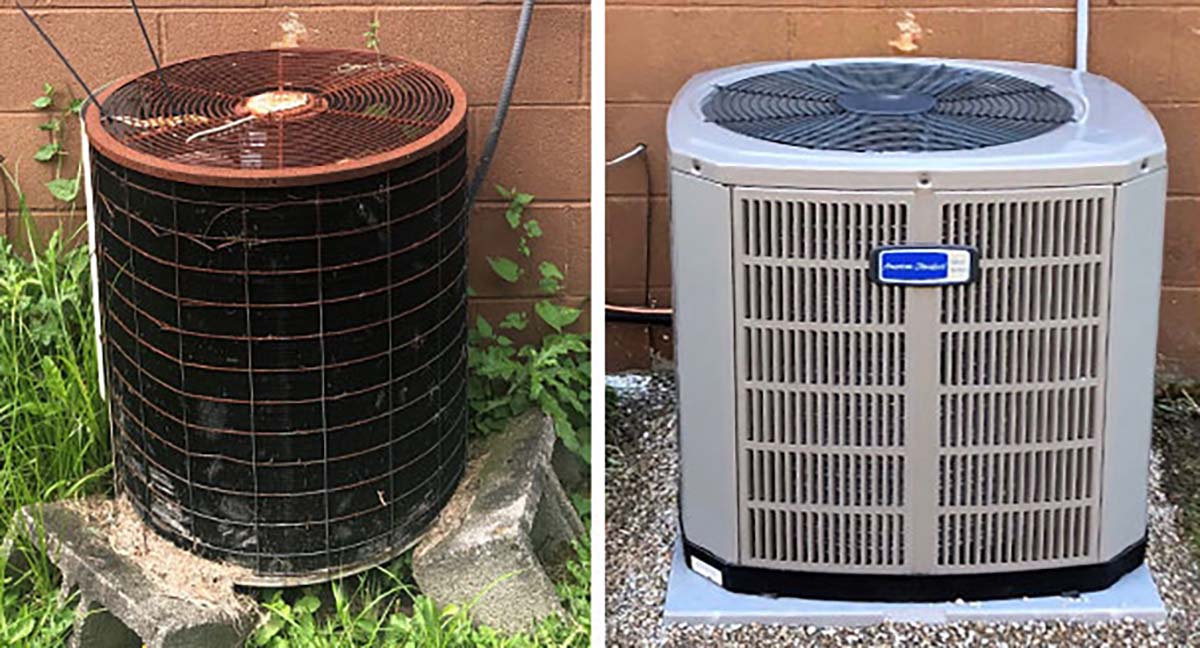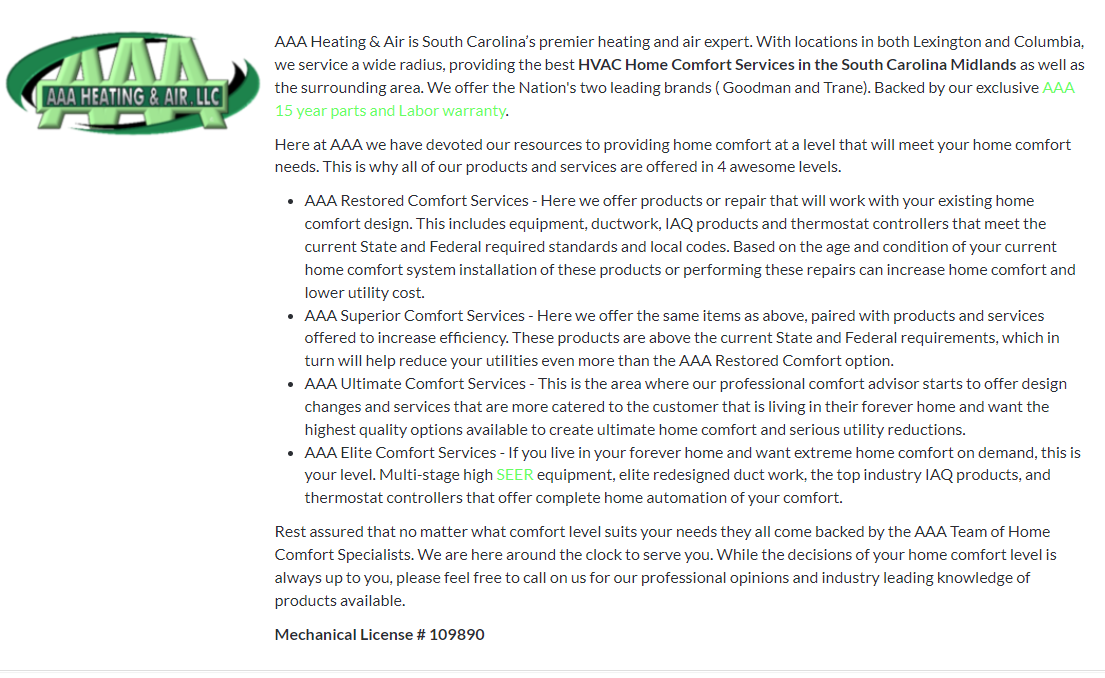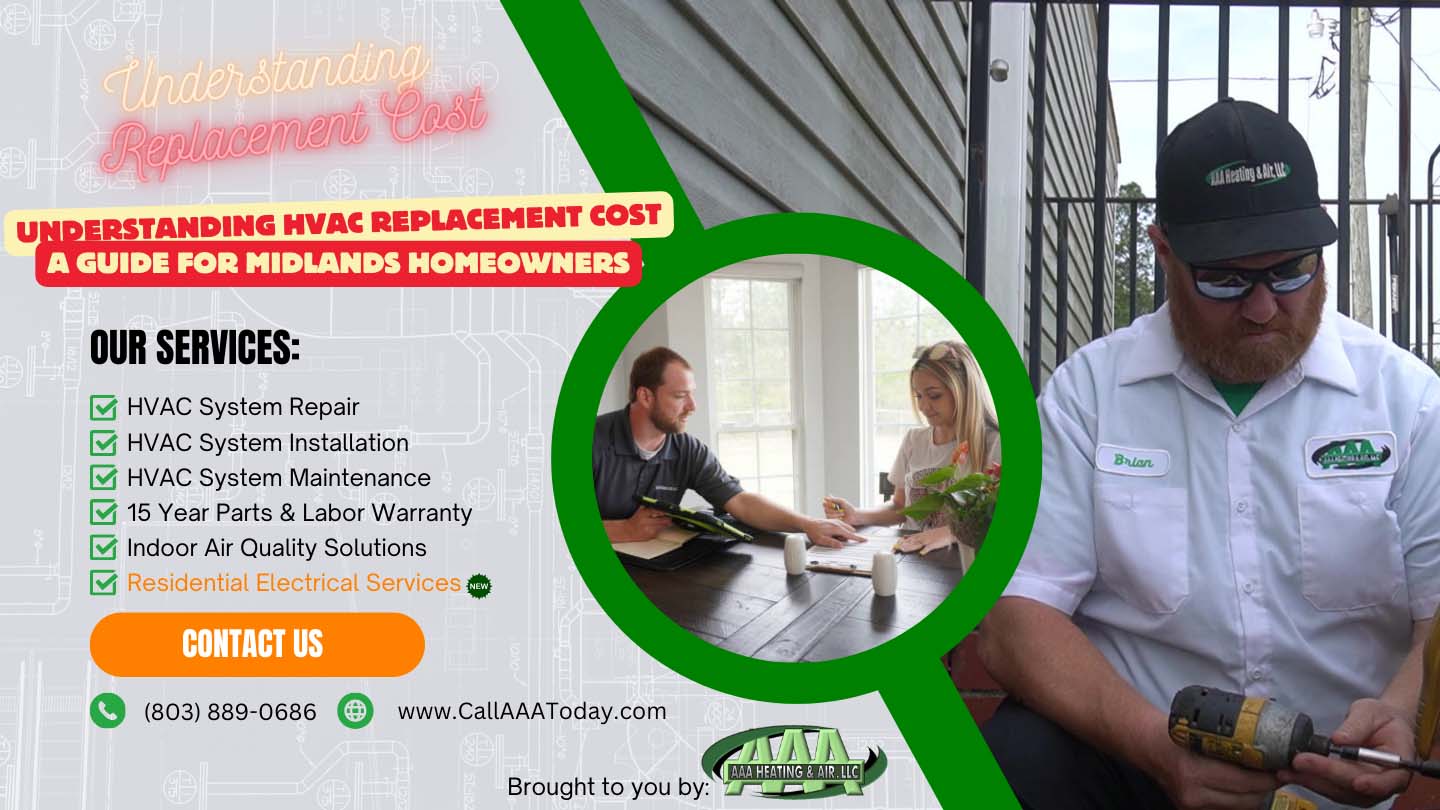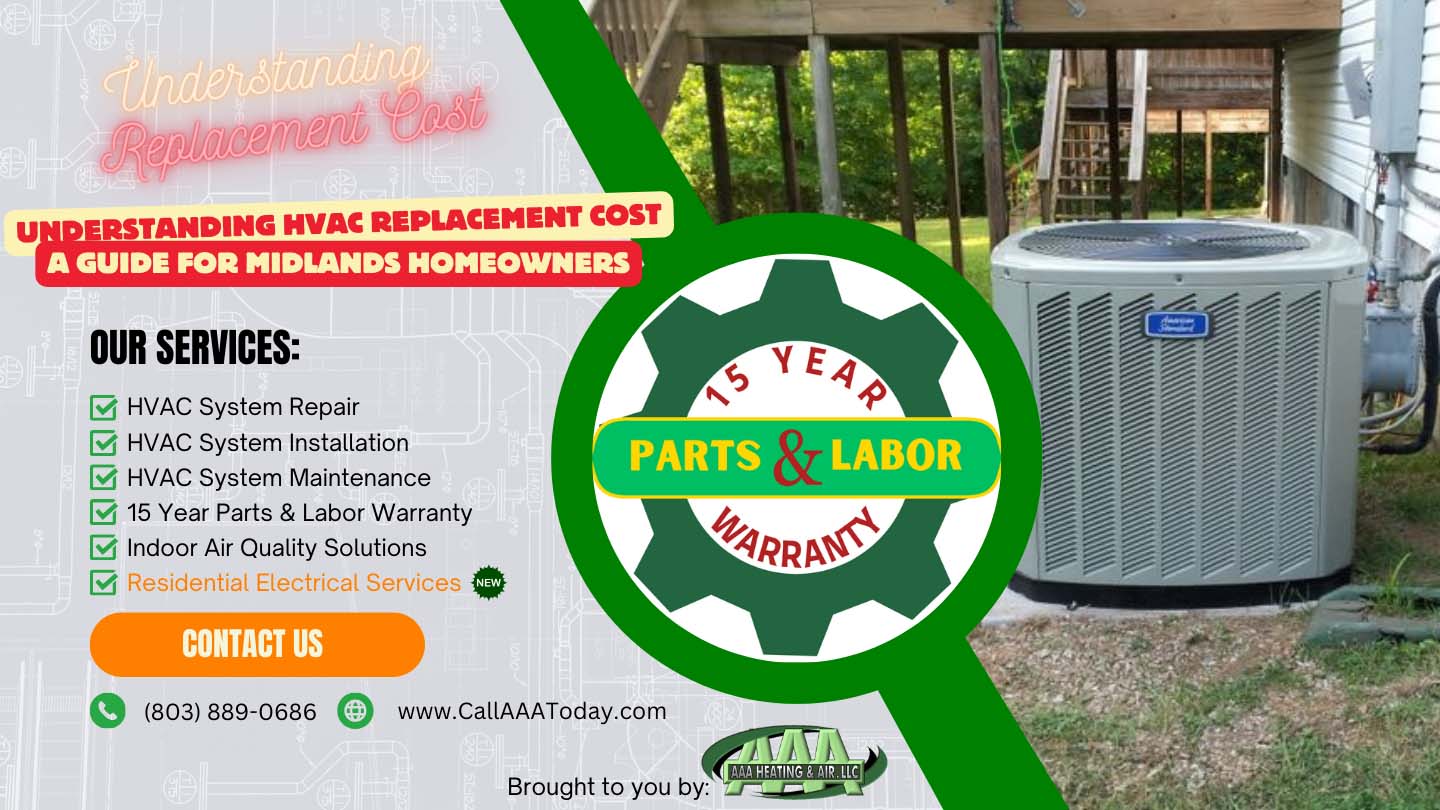Understanding HVAC Replacement Cost in 2025
Have you ever stepped into your home after a scorching day in the Midlands, only to find your air conditioner struggling to keep up? Or maybe you’ve noticed your heating bills creeping higher each winter, even as your system works overtime. If these scenarios sound familiar, you’re likely facing the reality of an aging HVAC setup. Replacing it might feel daunting, especially when you start thinking about the HVAC replacement cost. But here’s the good news: With the right knowledge, you can turn this into an opportunity for better comfort, lower energy use, and real long-term savings. As someone who’s helped countless South Carolina families navigate these decisions, I’ll walk you through what you need to know to make a choice that fits your life and budget.
In this post, we’ll break down the key factors driving HVAC replacement cost, share up-to-date averages for 2025, and offer practical steps to get the most bang for your buck. Whether you’re dealing with a sudden breakdown or planning ahead for efficiency gains, understanding these elements empowers you to avoid surprises and invest wisely. Let’s dive in and get you on the path to a more reliable home environment.
What Drives HVAC Replacement Cost? The Basics You Need to Know
When it comes to HVAC replacement cost, no two homes are exactly alike—especially here in the humid, hot Midlands where systems work hard year-round. Several core elements come into play, and grasping them helps you budget effectively and choose options that align with your needs.
First off, consider the size of your system. HVAC units are measured in tons or BTUs, based on the square footage they need to cool or heat. A larger home might require a 4- or 5-ton unit, which naturally costs more than a 2-ton model for a smaller space. If your current setup is undersized or oversized, replacing it with the right fit can prevent inefficiency and higher utility bills down the line. Think about it: Why pay extra for energy waste when a properly sized system keeps things balanced?
Next, the age and condition of your existing unit matter a lot. Systems over 15 years old often use outdated refrigerants like R-410A, which are being phased out under new 2025 federal regulations aimed at reducing environmental impact. This shift to eco-friendlier options, such as R-454B, has pushed up costs across the board. An older, inefficient system might also need ductwork repairs or modifications during replacement, adding to the total. But replacing proactively—before a total failure—can save you from emergency fees and rushed decisions.
The type of system you choose is another big influencer. Are you sticking with a traditional split system, or upgrading to a heat pump for dual heating and cooling? Electric furnaces, gas models, or ductless mini-splits each have their price points. For instance, heat pumps are gaining popularity in South Carolina for their energy efficiency in mild winters, but they might run higher upfront than a basic air conditioner. Efficiency ratings, like SEER2 (Seasonal Energy Efficiency Ratio) or HSPF (Heating Seasonal Performance Factor), play a role too—higher ratings mean better long-term savings, even if the initial HVAC replacement cost is steeper.
Finally, add-ons and upgrades can customize your setup but also affect the bottom line. Things like smart thermostats for remote control, enhanced air filtration to combat pollen and humidity, or zoning systems for room-by-room temperature management all add value. In our local climate, improved insulation or UV light purifiers can make a real difference in air quality and efficiency. The key? Prioritize what addresses your family’s specific challenges, like allergies or uneven cooling.

By weighing these factors, you position yourself to make a decision that’s not just about today but about creating a comfortable, cost-effective home for years to come.
2025 Average HVAC Replacement Costs: What to Expect in the Midlands
With inflation, supply chain shifts, and those new refrigerant rules kicking in fully this year, HVAC replacement cost has seen an uptick. Based on national data and local trends, here’s a realistic breakdown to help you plan.
For a full central HVAC system replacement—including both furnace and air conditioner—expect to pay between $8,000 and $20,000 on average in 2025. Most Midlands homeowners land around $12,000 to $15,000 for a standard 3-ton setup in a 2,000-square-foot home. This includes equipment, labor, and basic installation. If you’re just replacing the air conditioner, costs range from $5,000 to $13,000, with an average of about $7,500. Heat pumps? They’re typically $6,000 to $15,000, reflecting their all-in-one versatility.
Why the wide range? Location-specific factors like our high humidity and heat demand more robust systems, and labor rates in Columbia or Lexington can vary by contractor experience. Brands matter too—reliable names like American Standard or Goodman might cost more than budget options but offer better warranties and durability. And don’t forget: The 2025 refrigerant changes have added 10-20% to prices for compliant units, as manufacturers adapt to lower global warming potential standards.
Quick Tip Sidebar: Always factor in potential rebates. South Carolina’s energy incentives, like those from Santee Cooper or federal tax credits under the Inflation Reduction Act, can shave $1,000 or more off your HVAC replacement cost for high-efficiency models.
These figures aren’t set in stone, and getting personalized quotes is essential, but they give you a solid starting point to avoid sticker shock.
Signs It’s Time for HVAC Replacement: Don’t Wait Until It’s Too Late
Proactive homeowners know that catching issues early saves money and hassle. Have you noticed your system running constantly without cooling effectively? Or strange noises, like rattling or hissing, that weren’t there before? These could signal the end is near.
Other red flags include rising energy bills despite regular maintenance, uneven temperatures across rooms, or frequent repairs costing more than 10% of a new system’s price. If your unit is approaching 15 years old, it’s wise to evaluate options now, especially with 2025’s regulatory shifts making older repairs harder and pricier due to refrigerant shortages.
By recognizing these signs, you empower yourself to replace on your terms, ensuring uninterrupted comfort through our steamy summers and chilly winters.
7 Smart Tips to Lower Your HVAC Replacement Cost and Boost Value
Replacing your HVAC doesn’t have to break the bank. With a few strategic moves, you can trim expenses while enhancing your home’s efficiency. Here’s a step-by-step list to guide you:
- Prioritize Energy Efficiency: Opt for units with SEER2 ratings of 16 or higher. They might cost 10-20% more upfront, but you’ll recoup through 20-30% lower utility bills. In the Midlands, this means real savings during peak heat.
- Hunt for Incentives: Check for rebates from local utilities like Dominion Energy or federal credits up to $2,000 for qualifying systems. These can directly reduce your HVAC replacement cost—do your homework or ask your contractor.
- Upgrade Insulation and Ducts: Poor insulation wastes energy, so seal leaks or add more when replacing. This could cut costs by improving system performance and might qualify for additional rebates.
- Shop Multiple Quotes: Get at least three estimates from licensed contractors. Compare not just price but warranties, timelines, and reviews. A trusted local pro like us at AAA Heating & Air can ensure proper installation without hidden fees.
- Consider Financing Options: Many companies offer low-interest plans or promotions. Spreading payments makes the HVAC replacement cost more manageable without dipping into savings.
- Buy During Off-Season: Plan for spring or fall installs when demand is lower—contractors often discount to fill schedules.
- Maintain Your New System: Schedule annual tune-ups right away. This prevents costly issues and extends lifespan, maximizing your investment.
Implementing these tips turns a necessary expense into a smart upgrade that pays dividends in comfort and savings.
When DIY Isn’t Enough: The Value of Professional Help
You might handle basic tasks like changing filters yourself, and that’s great for everyday upkeep. But for replacement, professional expertise ensures safety, compliance with codes, and optimal performance. Mishandled installs can void warranties or lead to inefficiencies, costing more in the long run.
Here at AAA Heating & Air, we’ve seen how a proper assessment—factoring in your home’s unique layout and our local climate—leads to tailored solutions. It’s about partnering with someone who views your comfort as a priority, not just a job.
Ready to Take the Next Step Toward Better Home Comfort?
Navigating HVAC replacement cost in 2025 doesn’t have to be overwhelming. By understanding the factors at play, spotting signs early, and applying savvy tips, you set yourself up for a system that delivers reliable comfort, energy savings, and peace of mind. Remember, this isn’t just about fixing a problem—it’s about enhancing your daily life in the Midlands, where dependable HVAC is essential for well-being.
If you’re ready to explore options or need a no-obligation quote, reach out to us at (803) 889-0686 We’re here to guide you every step, ensuring you get the value you deserve. Or, schedule your consultation online 24/7 and let’s build a cooler, more efficient tomorrow together.
Updated: August 27, 2025
Original Post: Apr 27, 2023 at 09:00
How much HVAC Replacement Costs

Replacing an HVAC system in a home can be a significant investment. The HVAC Replacement Cost of the new unit and installation will depend on several factors, including the size and age of the current system, the type of replacement chosen, and any additional features or upgrades desired. It is important to understand these factors before making a decision about replacing an HVAC system so that homeowners can make well-informed decisions that fit their budget. In this article we will explore what impacts the HVAC replacement cost as well as provide tips for getting the most value out of your purchase. The size of the current HVAC system is one of the main factors that will determine the cost of replacement. A larger unit will require a larger, more powerful replacement model, and this can drive up the price significantly. In addition, an older system may be inefficient or in need of extensive repairs, which can also increase the total cost. It is important to consider these factors when choosing a new HVAC system so that it meets your needs without overstretching your budget. In addition to size and age, the type of system chosen for replacement makes a difference in terms of cost. Systems come in various configurations and fuel sources such as electric, natural gas or propane heat pumps, air conditioners and furnaces. Some have more features than others and can affect the cost of installation. The efficiency ratings for each system should also be considered, as these will determine how much energy (and money) is saved over time. Finally, any additional features or upgrades desired will further impact the total cost of replacing an HVAC system. These may include things like improved indoor air quality systems, better insulation, or new programmable thermostats. Understanding which additions you need to make to your current system will help you budget appropriately for replacement costs. Replacing a home’s HVAC system can be a costly endeavor, but there are ways to save money on the project. Understanding the factors that influence cost and taking advantage of every opportunity for savings is key to making sure you get the best deal. Here are some tips to keep in mind when shopping for an HVAC replacement:
- Look for Energy-Efficient Models: The efficiency ratings of each system should be taken into account, as these will determine how much energy (and money) is saved over time. Investing in an energy-efficient model can lead to long-term savings and increased comfort levels in your home.
- Take Advantage of Rebates and Tax Credits: Many local utility companies offer rebates or tax credits for purchasing energy-efficient systems, so take advantage of them if they’re available. It’s also a good idea to do research online or talk to your HVAC contractor about any other incentives or discounts available.
- Consider Upgrading Your Insulation: Good insulation is essential for maintaining proper air flow throughout a house and keeping temperatures comfortable year-round. If your current insulation is old or damaged, consider upgrading it when installing a new HVAC system as this can help reduce energy costs and make the home more comfortable in all seasons.
- Get Multiple Estimates From Different Contractors: Shop around before deciding which company you want to do business with, and make sure they provide written estimates up front. Comparing estimates from different contractors can help you find the best deal while still getting quality service and materials installed correctly.
- Purchase Parts Online: If you’re hiring someone else to install your new system, consider buying some of the parts online instead of paying full price through a contractor or supplier. You may be able to save money by doing some research ahead of time and finding deals on things like filters, thermostats, wiring, etc., that are compatible with your specific HVAC system needs.”

Written by: Jared M. Sewell

